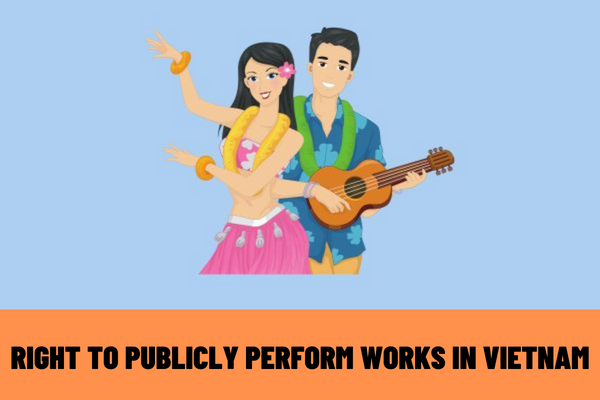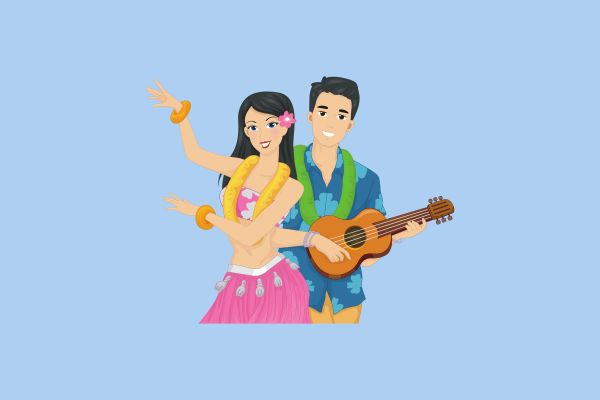Is the right to publicly perform works a copyright? What acts are considered to infringe on the right to publicly perform works in Vietnam?
Is the right to publicly perform works a copyright?
Pursuant to the provisions of Article 20 of the 2005 Law on Intellectual Property in Vietnam as amended by Clause 5, Article 1 of the 2022 Law on Amendments to some articles of the Law on Intellectual Property in Vietnam as follows:
Economic rights
1. Economic rights of authors include:
a) The right to create derivative works;
b) The right to publicly perform their works, whether directly or via audio and video recordings or any technological devices, at a location that is publicly accessible but the public cannot select the time and part of the works.
c) The right to directly or indirectly reproduce the entire or part of the work using any means or form, except for the cases specified in Point a Clause 3 of this Article;
d) The right to distribute, import for public distribution by sale, or transfer of other rights to ownership of the original or copies of their works in tangible forms, except for the cases specified in Point b Clause 3 of this Article;
dd) The right to broadcast, communicate to the public their works by wireless or wired devices, electronic information networks or other technical means, including the provision of their works to the public in a manner that it can be accessed by the public at their time and location of choice;
e) The right to lease the original or copies of cinematographic works and computer programs, unless these computer programs are not the main subject matter of the lease.
2. The rights specified in Clause 1 of this Article shall be exclusively exercised by the author or copyright owner, or by another organization or individual under authorization of the author or copyright owner.
When any organization or individual exercises one, several or all of the rights stipulated in Clause 1 of this Article and Clause 3 Article 19 of this Law, such organization or individual must ask for permission from the copyright owner, pay royalties and other material benefits to the copyright owner, except in the cases specified in Clause 3 of this Article, Articles 25, 25a, 26, 32 and 33 of this Article. In case a derivative work is created in a manner that affects the moral rights specified in Clause 4 Article 19 of this Law, the author's written consent must be obtained.
3. The copyright owner does not have the right to prohibit other organizations and individuals from:
a) Reproducing the work only for exercising other rights prescribed by this Law; temporarily reproducing the work following a technological process during the operation of the devices in order to transmit within a network between third parties via intermediates, or legally using the work without independent economic purposes and the copy is automatically deleted and cannot be recovered;
b) Subsequent distribution, import for distribution of the original or copy of a work the distribution of which has been carried out or permitted by its copyright owner.
Thus, according to the above provisions, the right to publicly perform works is a type of economic right belonging to the copyright.
Is the right to publicly perform works a copyright? What acts are considered to infringe on the right to publicly perform works in Vietnam?
What is the guidance on the scope of exercising the right to publicly perform works in Vietnam?
Pursuant to the provisions of Article 15 of Decree No. 17/2023/ND-CP, the right to publicly perform works is exercised directly or indirectly by the copyright owner or authorized by others, whether directly or via audio and video recordings or any technological devices, at a location that is publicly accessible.
Specifically, the scope of exercise of the right to publicly perform works is guided as follows:
Right to publicly perform works
The right to publicly perform their works, whether directly or via audio and video recordings or any technological devices, at a location that is publicly accessible but the public cannot select the time and part of the works specified at Point b, Clause 1, Article 20 of the Law on Intellectual Property shall be construed as follows:
1. For works expressed in languages or written works specified at Points a and b, Clause 1, Article 14 of the Law on Intellectual Property: Is the right of the copyright owner to exclusively make or permit others to make presentations or presentations accessible to the public, to perceive it by hearing, but the public cannot freely choose the time and part of the work, including the perception from the outside of the space where the presentation is taking place, by means of a monitor, loudspeaker or similar technical device.
2. For musical works specified at Point d, Clause 1, Article 14 of the Law on Intellectual Property: The right of the copyright owner to exclusively perform or permit others to perform a performance accessible to the public, perceive the work by hearing or present the work on stage to the public, but the public cannot select the time and part of the works, including the perception from the outside of the space where the performance is taking place through a monitor, loudspeaker or similar technical device.
3. For cinematographic works specified at Point e, Clause 1, Article 14 of the Law on Intellectual Property: Is the right of the copyright owner to exclusively perform or permit others to make a presentation accessible to the public, feel cinematographic works through technical means, but the public cannot freely choose the time and each part of the work.
4. For works of fine art and photographic works specified at Points g and h, Clause 1, Article 14 of the Law on Intellectual Property: means the right of the copyright owner to exclusively exercise or permit others to carry out the exhibition, display or presentation for the public to see the original or a copy of the work.
Thus, the right to publicly perform their works, whether directly or via audio and video recordings or any technological devices, at a location that is publicly accessible but the public cannot select the time and part of the works.
What acts are considered to infringe on the right to publicly perform works in Vietnam?
Pursuant to the provisions at Point e, Clause 1, Article 66 of Decree No. 17/2023/ND-CP as follows:
Identify elements of copyright infringement
1. Acts of copyright infringement may fall into one of the following forms:
...
e) Infringing on the right to publicly perform works: Performing, reading, displaying, exhibiting, showing, performing works in public places or selling tickets, collecting entrance fees without consent of copyright holders and co-owners of copyright in accordance with law, except for the cases specified in Articles 25 and 25a of the Law on Intellectual Property;
Thus, acts that are considered infringing the right to perform works in public include:
- Performing, reading, displaying, exhibiting, displaying or performing works in public places without the consent of the copyright owner or co-owner;
- Performing, reading, displaying, exhibiting, showing, performing works where tickets are sold or collected without the consent of the copyright owner or co-owner of the copyright.
LawNet
